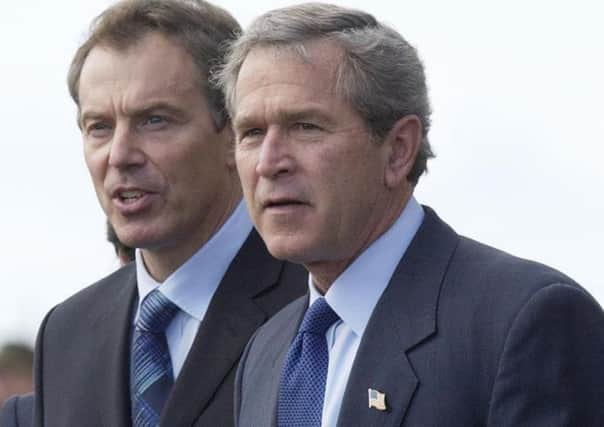Chilcot report: Bush-Blair letters reveal special relationship


Notes written by Mr Blair to the then US president, revealed by the report chronicle how their personal interaction was the driving force in the US-UK relations at the time and ultimately was one of the key factors leading the British prime minister to commit forces.
Nowhere is this more clearly illustrated in the five words that opened a July 2002 memo from Mr Blair: “I will be with you whatever.”
Advertisement
Hide AdAdvertisement
Hide AdThe document was immediately seized on as evidence Mr Blair was already committed to war nine months ahead of the invasion although he has insisted it was a broad expression of support for the US.
However, almost as significant is the tone it struck, turning a major foreign policy issue into a personal challenge for the pair to face together.
In September that year, Mr Blair sent a handwritten note to praise the president’s speech to the UN General Assembly as “brilliant” which had challenged everyone to “come up to the mark”.
The cache of letters released alongside the Chilcot report include one from Mr Blair in February 2003 on the tabling of a second UN resolution, following the one passed the previous year calling on Saddam Hussein to disarm, included the UK prime ministers reservations about Hans Blix, the UN’s then chief weapons inspector.
Advertisement
Hide AdAdvertisement
Hide AdMr Blair expressed frustration that the approach Mr Blix was taking was leading to “confusion” and allowing countries such as France and Germany to determine Hussein was complying with the original resolution as long as inspectors were being given time to find weapons.
“My faith in Blix is somewhat shaken,” Mr Blair wrote.
While the initial invasion was still in its early stages in March 2003, Mr Blair penned an enthusiastic note, titled “The Fundamental Goal” , urging President Bush to seize the moment as an opportunity to “define international politics for the next generation.”
The memo was apparently designed to encourage president Bush to adopt a different tone to try and broaden international support for action against unsavoury regimes.
Mr Blair bemoaned the “wholly warped views of the so-called right in American politics” which led to the “fatuous irony of millions of liberal-minded people taking to the streets to defend the most illiberal regime on earth”.
Advertisement
Hide AdAdvertisement
Hide AdHe told president Bush: “People need to see you as you are. No-one doubts the toughness. They need to see the sensibility.”
There was a much less bullish tone weeks later as the realities of the task ahead sank in following Mr Blair’s visit to Iraq.
The then prime minister admitted: “the task is absolutely awesome and I’m not at all sure we’re geared for it. This is worse than re-building a country from scratch.
“We start from a really backward position.
“In time, it can be sorted. But time counts against us …
“My sense is: we’re going to get there but not quickly enough. And if it falls apart, everything falls apart in the region.”
Advertisement
Hide AdAdvertisement
Hide AdThe correspondence between the two leaders continued right up until the end of Tony Blair’s time in Downing Street.
In a memo written to president Bush a month before Mr Blair stood down, he described the pair as “lone voices” in confronting extremist Islamism in the Middle East.
Mr Blair wrote: “I think we need radically to upgrade our political approach across the region; to change the terms of debate from whether we can win to an insistence we have to win; that we cannot afford to lose.
“We have 18 months left to do it. Otherwise, certainly here, but I suspect in the US too, the next generation of leaders will be desperate to disengage”.